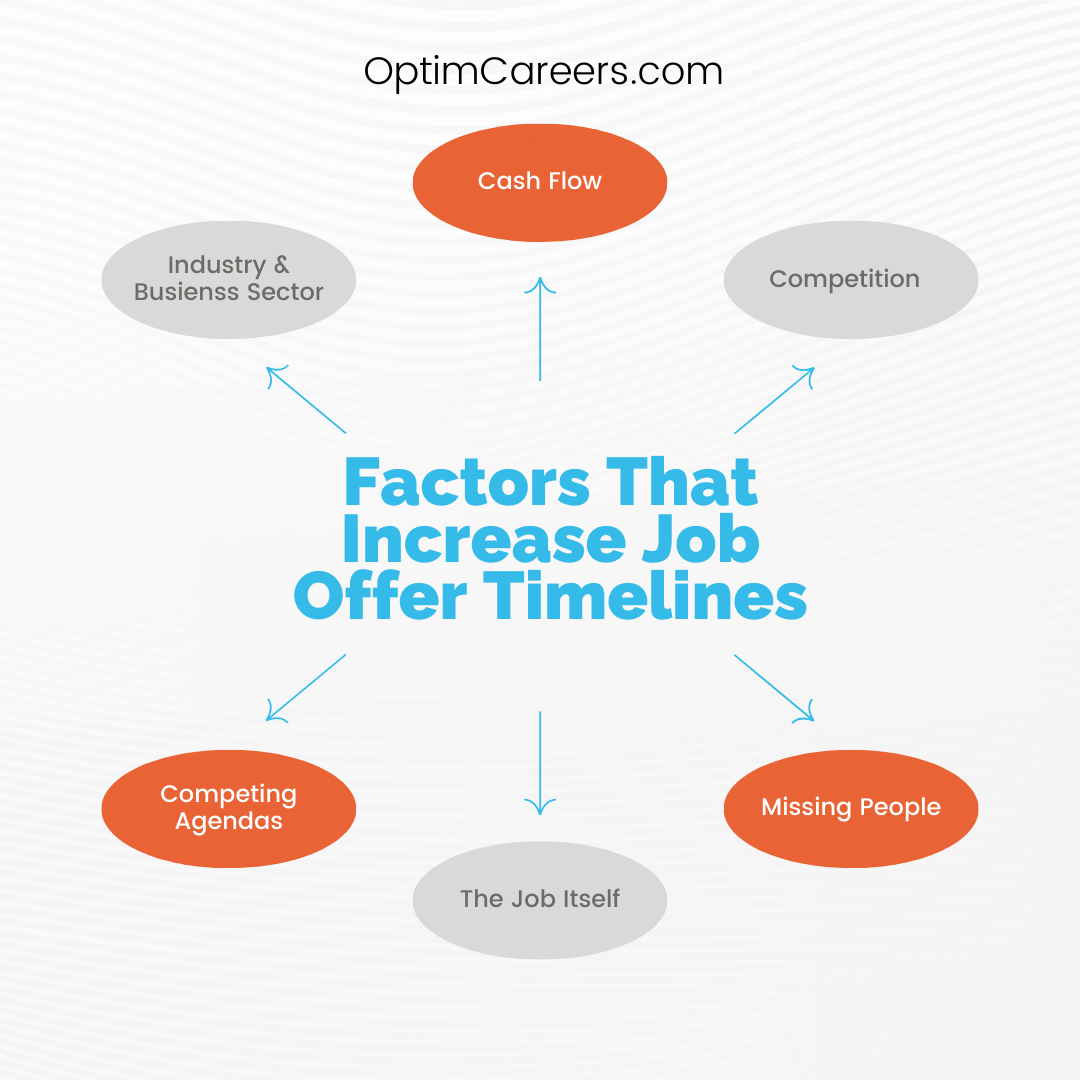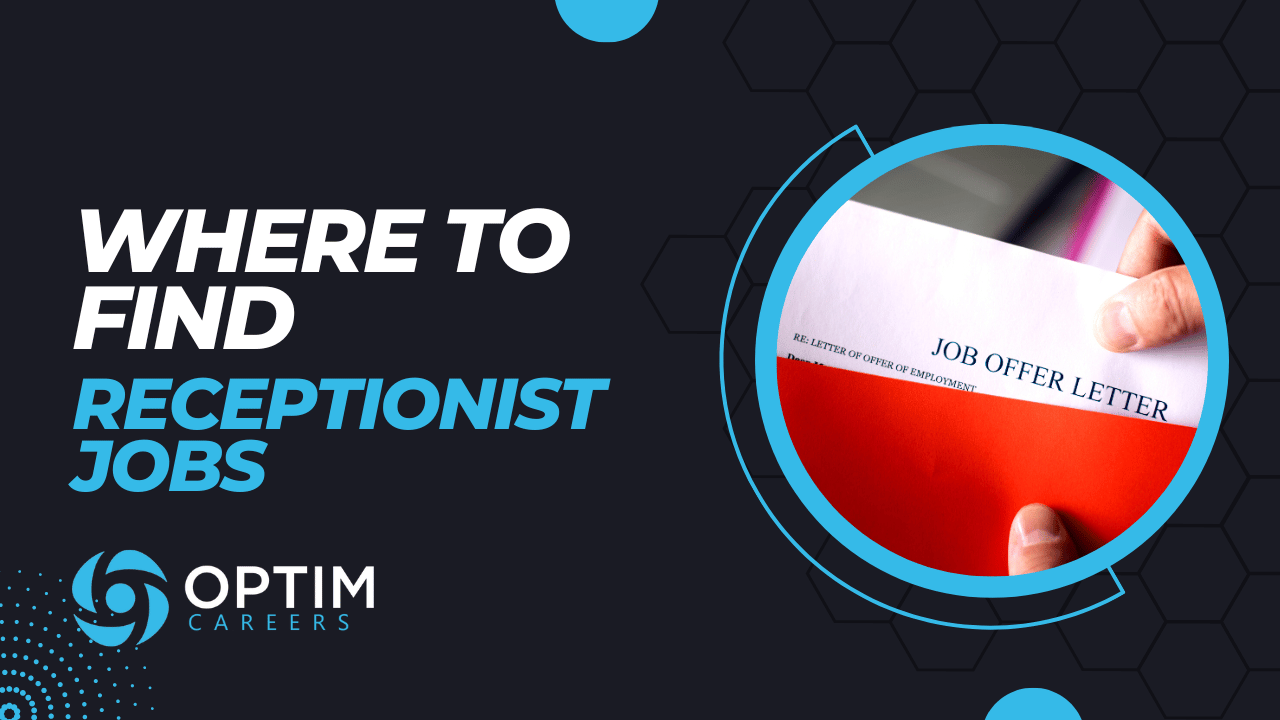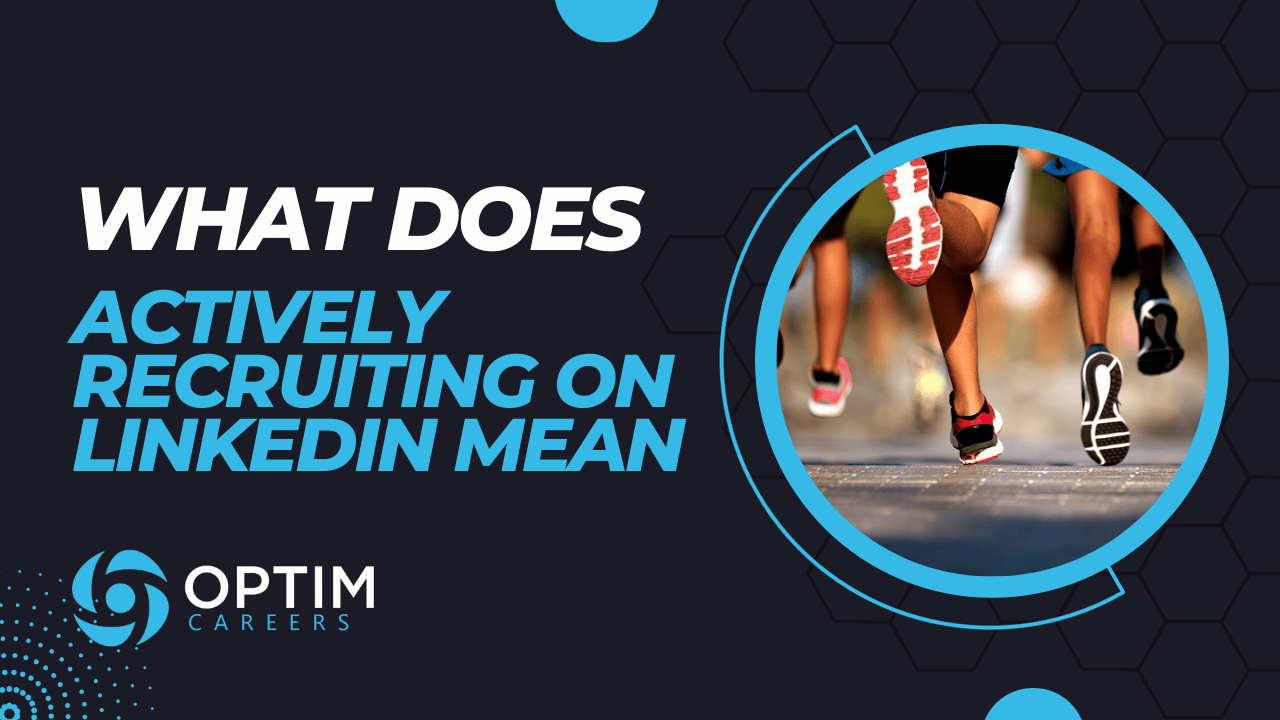Job Offer Taking Too Long [Here’s Why]
Written By: Cole Sperry
Nothing is worse than sitting by your phone, refreshing your email, and waiting to hear back about a job offer. For most of us, it will take longer than we think.
In this article, I want to break down:
What all goes into making a job offer.
How long it usually takes a company to extend an offer.
Why it takes so long.
Factors that can delay your job offer.
And what you can do to help speed up the process.
What Goes Into Making a Job Offer
Job offers are like icebergs. Candidates don’t see most of the work that goes into making one. Most of us are aware of applications and interviews, but there’s so much more to the job offer process.
After you submit your application, it has to be screened. Some jobs may only receive a few applicants, but for recruiters who know how to write good job descriptions, it could be very high. For some of my roles, I’ve received over 200 applicants on the first day. The more people applying, the more time that takes. And sadly, most of them won’t be qualified. I’ve had many Subway Sandwich artists shoot their shots for Senior Accountant roles over the years. When these activities happen, it slows the process down for everyone.
Some companies have to comply with EEOC rules and may have to post a job for 30 days before they can hire someone along with other requirements.
Other companies will require a minimum level of sourcing to take place outside of simply reviewing applicants. So even if you are the best candidate and applied on day one, you may still be waiting for all sourcing activities to hit their threshold.
After all of that, we’ve finally gotten to phone screens and interviews. Depending on the importance and sensitivity of the job, there may be multiple rounds of interviews involved.
Sometimes the hiring team will reevaluate the position based on candidate feedback. This can delay the process even more. It’s not uncommon to conduct a few interviews and realize after talking with some great candidates that the job scope should be changed slightly. This could send everyone back to the beginning.
Provided there is no reevaluation of the role, many companies allow for their teams to have input. These are multiple people in multiple jobs who all have different priorities. Hiring may not be their top priority either. It only takes one person to delay and draw out the job offer process.
If you’ve made it this far, salary negotiations may take place. Depending on both your and the employer’s skill level in handling these, the process could be longer than expected.
After you’ve agreed on a number, reference checks, background checks, and even credit checks may need to be conducted. Some of those can take a week or more, especially if you’ve lived in multiple places.
And let’s not forget all of the other human resources and legal compliance items that have to be checked off before an offer can be extended.
Even the offer letter can take days or weeks. For many companies, their HR teams are stretched thin and HR is responsible for drafting offer letters.
That’s a good overview of what goes into the process. Of course, it varies from company to company. Some have more steps, some have fewer, but you get the idea. There’s a lot that goes into making a job offer.
How Long Does The Average Job Offer Take From Start to Finish
Recent data shows that employers are taking longer to extend job offers and I’m not surprised given the current economic conditions in many industries. When cash flow is tight, hiring always takes longer. The average time to fill an open position has risen over the past 3 years from 34 days to 44 days (SHRM).
There are many factors that can decrease or increase that time frame, which I’ll discuss later, but I’ve seen some job offers take nearly 2 months to complete. And that’s 2 months after the candidate had their first interview, not from the time they advertised the job.
Based on my experience recruiting, the average time to hear back after an interview is between 1 to 2 weeks, but it varies a lot.
Why Do Job Offers Take So Long
Compliance
Companies are risk-averse and they should be. Every HR person I know wants to keep their job and a big part of that involves minimizing risks in the hiring process. If the company works with the government in any way, they’re subject to even more compliance and reporting on their hiring practices. All of this increases the time to extend a job offer.
I’ve worked with several manufacturing and construction companies that bid on government contracts. I can think of one instance where I had presented the candidate they wanted to hire, but couldn’t extend a job offer for another 30 days because they had to advertise it first to stay compliant.
In addition, checking references and waiting on background checks can take quite a bit of time. If you’ve moved a lot, background checks can take weeks when multiple states and counties are involved. And if your references aren’t expecting calls, they too can delay your job offer.
It’s an Expensive Purchase
For many employers, human labor is one of the most expensive line items on their P&L. Like anyone making a large purchase, you don’t do it in a hurry. You wouldn’t buy a house after looking at a listing. You’d want to see it, walk through it a couple of times, maybe have a home inspection done first, and then compare it to a few different homes. Buying a house is a big investment. Hiring you is also a big investment and people want to know it’s the right one.
Unexpected Changes
As frustrating as it is for you and for me as the recruiter, things change all the time. One company I worked with was about to extend a job offer when one of their largest contracts fell through. In that situation, they paused the offer until they could figure out what their needs were without that contract. Eventually, other contracts came through and they hired someone, but that event delayed offer letters by nearly 2 months.
Factors That Increase Job Offer Timelines
Industry
Depending on your industry, your job could take 20 days longer to materialize. Sectors like engineering typically have an average of 48 days to make a hire. While sectors like customer service are usually shorter, around 33 days.
Supply and Demand
It’s no secret in the recruiting field that when things are tight, hiring teams typically take longer to make decisions. They think longer term and are more cautious when cash flow is lower. On the flip side, when sales are booming and demand is high, less concern seems to be put into “getting the right candidate.” They just need people to keep up with their demands.
Competition
This one probably isn’t a surprise to you, but when there are more applicants, it draws out the process. Earlier I shared a story about a fast-food worker applying for a senior-level accounting position. Stuff like this happens all the time. When I asked my recruiting network about the percentage of unqualified people applying to their jobs, they told me it was around 80%.
This really slows down the hiring process because someone still has to go through and look at all those applications. And in an economic constriction, talent acquisition is often one of the first departments cut. That means fewer people to get through all those applications. By applying for jobs you are qualified for, you can help reduce the job offer timeline.
Company Structure
The more people involved in the hiring process, the longer it usually takes. A more bureaucratic organization often takes longer to decide on a hire than a solopreneur hiring their first hire.
Some companies have truly collaborative leadership styles and wait for everyone on the team to meet a candidate. That can mean multiple interviews which take time. And then everyone is waiting for feedback from each other before making a decision.
Missing People
Throughout my recruiting career, this has been one of the biggest delayers of offer letters. Someone necessary to the process is on vacation, sick, or they’re just busy with their day job. This can cause interviews to be rescheduled and push everyone in the process out by weeks if not more.
Waiting on Candidate #1
Let’s be real for a minute, you may get a job offer but you may not be their first choice. You’ll never know but it happens all the time. The first-choice candidate backs out and then the company offers the job to their #2 candidate. Depending on how quickly #1 candidate responds, you could be waiting on a job offer if you’re in the #2 spot.
Job Restructuring
I’ve worked with hundreds of hiring managers over the years and it’s not uncommon for them to change their mind after interviewing a few people. Ok, maybe they don’t change their mind as much as they realize their expectations were off. Nonetheless, this leads them to change requirements and restructure roles during the middle of the recruiting process.
While this may not impact you directly if you’ve already interviewed, it may delay things while the company sources a new pool of talent to compare to your skill set.
Competing Agendas
While frustrating for candidates and recruiters, no one lives in a vacuum. Chances are there will be multiple people involved in the hiring decision and they may not all have the same priorities. While one manager may be desperate to hire you, they could be waiting on others who don’t see this hire as a priority.
The Role Itself
Just like renting an apartment may be a quicker decision than buying a $400,000 home, it works the same way with recruiting. If you’re applying for a job that is working with billions of dollars of equipment sending rockets into space, that company is not going to let anyone get close to that stuff. The hiring process will naturally take longer as they will be more cautious.
Compared to a customer service job, the risk is lower so the company may move quickly. It doesn’t always work that way because all of these factors are at play, but you can count on the process taking longer when the position has more risk associated with it.
How to Speed Up the Job Offer Process
As you can see by the above factors, there’s not a lot you can do to control most of the job offer process. However, there are some things you can control and you should focus on those.
Have References Ready
Be ready to hand over references with email and phone numbers so the hiring team isn’t waiting on you. There’s enough going on to slow down the process. Don’t contribute more delay. Also, prep your references ahead of time. Ask the recruiter or manager when they plan to call your references so you can give them a heads up and they expect the call. You want to try and avoid recruiters and references playing phone tag. That could add a week to your offer letter if both sides are busy.
Know Your Salary Requirements
Be prepared from the first phone call to discuss salary if it comes up. When hiring teams are informed of your expectations upfront, it can minimize lengthy salary negotiations at the end of the job offer process.
Be Flexible
Make the process as easy on the hiring team as possible. If they ask for your interview availability, do your best to give them multiple dates and times to choose from. Every time someone has to go back and forth with requests it delays the process. And sadly, not all recruiters are trained well. Be proactive with your communication even if they aren’t.
Get Commitments on Followup
Anytime you interact with someone in an interview or phone call, ask them about their timeline. You want to know when they expect to get back in touch with you. Things may happen and they may not have feedback by the date they said, but this opens the door for you to follow up with them if you do not hear from them on the expected date.
Set a task for yourself to follow up on the date they suggested. One of the best tools for this is Teal. You can sign up for free.
If you don’t hear from them on the date they anticipated, you can send a short email telling them how you’re making their job easier by following up with them because you understand how busy they must be. It’ll also give you another opportunity to show off your transferable skills.
Communicate Other Offers and Interviews
A good recruiter will probably ask you about this anyhow, but not all will. If you have other offers or interviews pending, you should let the hiring team know. In some instances, it can speed things up if they like you and are worried about losing you as a candidate. Don’t ever make things up though. The truth always comes out sooner or later, it’s best to be honest.
Don’t Stop
No matter how well an interview went or what someone promised you, don’t stop your job search. While this may not impact a specific offer, it will impact how long it takes you to receive a job offer overall.
I’ve seen way too many job seekers tell me that the hiring manager told them they had the job and then were ghosted afterward.
Related Article: Ghosted After Job Offer - What to Do Next
A lot of things are out of yoru control, but you should focus on the things you can control. Don’t assume the worst. Remember that no feedback is not always negative feedback, it sometimes means there simply is no feedback yet.
How Long Should You Wait For a Job Offer
The short answer - don’t wait on any job offer. I’ve seen many deals fall apart at the last minute for a variety of reasons. Reasons that are often outside of a candidate’s control. I would never wait for a job offer. Until you have a signed offer letter and you have started your first day, keep your options open and keep searching for your next job.
Job Offer Taking Too Long Conclusion
There are a lot of things that go into making a job offer. Many of those things are out of your control.
The time it takes employers to extend a job offer is slowly increasing and varies from industry to industry, role to role.
Factors such as cash flow and the economy can also impact how long it takes to receive a job offer after interviewing.
You can control things such as preparing references, discussing salary early, and giving multiple times for interviews. All of these can prevent delays.
Job Offer Taking Too Long Recommended Reading
Ghosted After a Job Offer [What to Do and How to Avoid It]
Signs You Will Get the Job After an Interview [24 Common Signs of Those Hired]








![Director vs Manager [Knowing the Difference Could Save You $30K]](https://images.squarespace-cdn.com/content/v1/5e7a582d35406e67f528c98d/bd05ce4d-1ccf-4527-9453-5b14abdac2db/Director+vs+Manager.png)
![Evidence of Excellence [Examples and Descriptions]](https://images.squarespace-cdn.com/content/v1/5e7a582d35406e67f528c98d/ac00227c-025e-4196-997f-3cfd9da51332/Evidence+of+Excellence.png)

![Full Desk Recruiting [Is It Better?]](https://images.squarespace-cdn.com/content/v1/5e7a582d35406e67f528c98d/1fa4fa3e-fd57-4298-9bba-b3b528a705b3/Full+Desk+Recruiting.png)
![Fintech Recruiters [15 Top Recruiters in Fintech]](https://images.squarespace-cdn.com/content/v1/5e7a582d35406e67f528c98d/b8402849-eef4-45bd-a5ec-60d65bbd5a2a/Fintech+Recruiters.png)
![Marketing Job Boards [14 Niche Job Sites]](https://images.squarespace-cdn.com/content/v1/5e7a582d35406e67f528c98d/da0b4d51-cc41-47ff-9df7-dbfffc992aa7/Marketing+Job+Boards.png)
![Remote OK [Job Board Review]](https://images.squarespace-cdn.com/content/v1/5e7a582d35406e67f528c98d/c871aa33-80aa-493a-8305-cd1df73266bb/Remote+OK.png)
